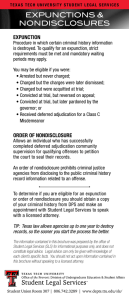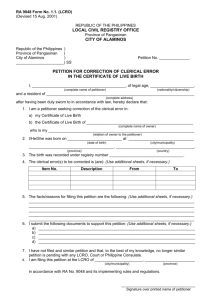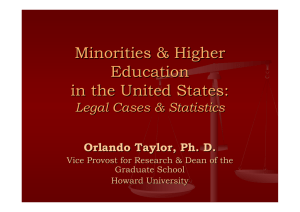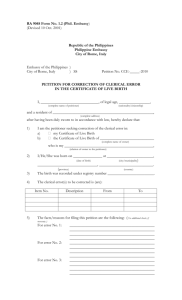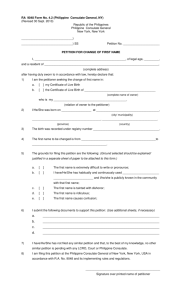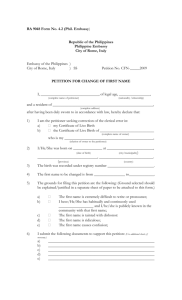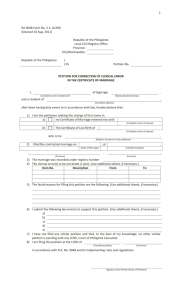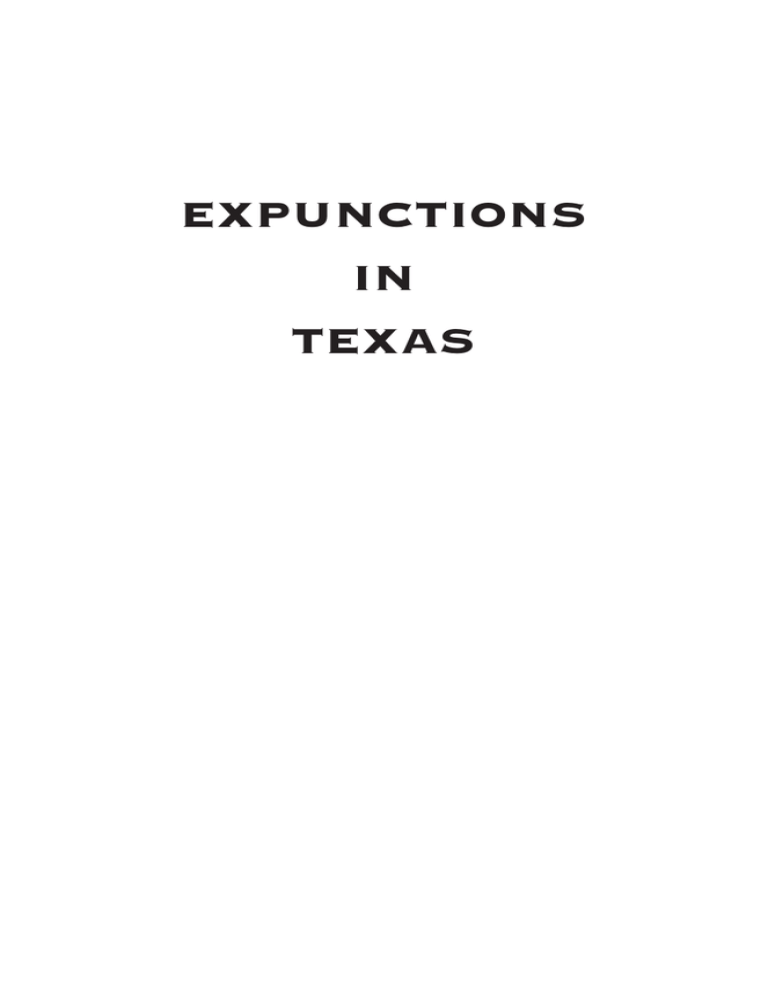
EXPUNCTIONS
IN
TEXAS
Texas Young Lawyers Association
Family Law Committee
P.O. Box 12487, Capitol Station
Austin, TX 78711-2487
(800) 204-2222 Ext. 1800
For additional family law resources, visit www.tyla.org.
Produced as a public service by the
Texas Young Lawyers Association.
The information in this brochure is for educational and informational
purposes only. Please consult an attorney regarding specific legal questions.
Copyright 2010
TEXAS YOUNG LAWYERS ASSOCIATION
Curriculum materials created by the Texas Young Lawyers Association. All rights reserved. No
part of these materials may be reproduced in any form or for any other purpose without the
written consent of the Texas Young Lawyers Association.
TABLE OF CONTENTS
EXPUNCTION AND NON-DISCLOSURE ORDERS IN TEXAS . . . . . . . . . 1
JUVENILE OFFENSES . . . . . . . . . . . . . . . . . . . . . . . . . . . . . . . . . . . . . . . . . . . . . . . 2
APPLYING AND OBTAINING AN EXPUNCTION . . . . . . . . . . . . . . . . . . . . . . 2
NONDISCLOSURE ORDERS . . . . . . . . . . . . . . . . . . . . . . . . . . . . . . . . . . . . . . . . 3
PETITION FOR EXPUNCTION OF RECORDS . . . . . . . . . . . . . . . . . . . . . . . . . 5
ORDER FOR EXPUNCTION . . . . . . . . . . . . . . . . . . . . . . . . . . . . . . . . . . . . . . . . . . 8
EXPUNCTION AND NON-DISCLOSURE
ORDERS IN TEXAS
Everyone, at some point, has made a bad mistake or has been in the wrong place
at the wrong time resulting in trouble. Unfortunately for some, trouble can result in a
criminal record reflecting an arrest, charge or conviction. While most convictions cannot
be removed from a person’s record, Texas law does allow individuals to permanently
remove information about an arrest, charge or conviction from their permanent
records in certain circumstances. This is called an expunction. Once a person’s record
is expunged, all information is removed from the criminal record and that person can
deny the incident ever occurred.
Records eligible for expunction include:
i.
ii.
iii.
iv.
v.
vi.
vii.
viii.
An arrest for a crime that was never charged;
A criminal charge that was ultimately dismissed;
Certain qualifying misdemeanor juvenile offenses;
Conviction of a minor for certain alcohol offenses;
Conviction for Failure to Attend School;
Arrest, charge or conviction on a person’s record due to identity theft
by another individual that was actually arrested, charged or convicted of
the crime;
Conviction for a crime that was later acquitted by the trial court or the
Criminal Court of Appeals;
Conviction for a crime that was later pardoned by the Governor of Texas
or the US President.
Not all individuals with records eligible for expunction above qualify to receive
an expunction. The Court will not grant an expunction to adults who have received
deferred adjudication or probation or who have been convicted of a felony within
five years of the arrest the person is seeking to have expunged. The Court will also
not consider expunction if the offense is part of a “criminal episode” and the applicant for the expunction either has charges pending for a different crime that occurred
during that same episode or the person was convicted of a crime that occurred during that same alleged episode.
Finally, a person cannot file a petition seeking expunction of a felony charge that
has been dismissed if the statute of limitations for the crime subject to the dismissal
has not yet expired. The statute of limitations is the amount of time that the state or
1
county has to prosecute an action against a person after that person has been arrested
for an offense. The statute of limitations is different depending on the crime, but
most are at least three years.
Juvenile Offenses
In many instances, any record of a conviction for an offense that a person committed when that person was a minor can be expunged. A misdemeanor punishable
by fine committed prior to the age of 17, an offense committed by a minor under
the Alcoholic Beverage Code and a conviction for Failure to Attend School are all
offenses that may be expunged. As in expunctions for an adult, the individual must
follow certain procedures and meet specific criteria before the court will expunge the
person’s record. For example a person cannot apply for an expunction for a juvenile
record until after that person has reached a certain age. Additionally, a person cannot have had multiple convictions.
When a juvenile offender is convicted of an offense, the courts are sometimes
required to give the child and the child’s parents information about the expunction
process and how to apply for an expunction. Different procedures can apply to
expunctions for juvenile offenses. Consequently, you should conduct additional
research or consult an attorney before attempting to apply for an expunction of a
juvenile record.
Applying and Obtaining an Expunction
Prior to beginning the process for expunction, you should review Chapter 55 of
the Texas Code of Criminal Procedure and any other statutes that may apply to the
offense you are attempting to have expunged. The first step in gaining an expunction
is to file a Petition for Expunction with the district court requesting that the court
grant an Order for Expunction. A basic form for both the Petition for Expunction
and Order for Expunction are included at the end of this pamphlet. As with any legal
proceeding, errors in following procedure can have serious consequences. Therefore,
it is always advisable to seek the assistance of an attorney.
The person applying for the expunction, known as the Petitioner, will have to
prepare and file the Petition or hire an attorney to do so. The Petition should include
certain personal identifying information of the Petitioner, the offense charged, when
the arrest occurred, when the alleged offense occurred, the name of the arresting
agency and a list of all of the agencies or facilities that may have a record of the arrest.
2
If the offense was charged, the Petition should also contain the cause number for the
case, the name of the court, how the charge was resolved (i.e. dismissed, no billed by
the grand jury or acquitted) and the date the charge was resolved. The Petition must
be verified, meaning that you must have it notarized when it is signed. Finally, the
Petition should contain a blank “notice of hearing” so that the court can set a hearing
on the issue.
After completing the Petition, it will need to be filed with the proper court.
Whether the Petition should be filed in municipal, county or district court will
depend on the level of the offense. If the offense was charged, then the Petition
will most likely need to be filed in the same Court that was assigned to the case
when it was originally charged. After the petition is filed, the court will schedule a
hearing and send notice of the hearing to all applicable agencies and facilities, known
as Respondents. After the notice has been properly sent, the court will conduct a
hearing to allow the Respondents an opportunity to contest the expunction.
However, if the Petitioner meets all of the necessary requirements, the court will
grant the expunction.
After the court grants the expunction, the Petitioner will need to present an
Order for Expunction to the court for the judge’s signature. The court will likely
expect the Petitioner to have an Order drafted and ready for the judge to sign at the
hearing on the expunction. The signed Order must then be submitted to any and all
agencies or organizations that may have records or files relating to the expunged
offense. The records will then either be deleted or returned to the court clerk pursuant
to the court’s Order for Expunction.
Nondisclosure Orders
If expunction is not an option due to the nature of the offense, charge or conviction, it may be possible to obtain an Order for Nondisclosure. A nondisclosure
order does not completely destroy all record of any offense, but will limit the accessibility of the records. Records subject to a nondisclosure order are removed from
public record and cannot be released or accessed by certain private parties. However,
the records will remain available to government agencies and will be admissible in
certain court actions. Under the Government Code §411.081, a person who has successfully completed deferred adjudication and received a discharge and dismissal of
the deferred adjudication may apply for a nondisclosure order.
3
In addition to successful completion of probation or deferred adjudication, an
individual must meet certain criteria in order to qualify for a Nondisclosure Order.
For example, a person cannot apply for a nondisclosure order until after the statutory
waiting period has passed. During that time, the applicant cannot have been convicted
of any other offenses. The waiting time varies anywhere from 0 to 10 years depending
on the offense. Individuals charged with family violence, a sex offense requiring registration, aggravated kidnapping, murder and some other specific types of offenses will
likely not be able to obtain a Nondisclosure Order.
The process for obtaining an Order of Nondisclosure is substantially similar to
obtaining an Order for Expunction. A petition must be filed with the court that was
involved with the original offense. A hearing will be conducted after proper notice
to the required parties and the court will determine, at that time, whether to grant
the order. It should be noted that the court generally has more discretion to decide
whether or not an Order for Nondisclosure should be granted than a judge would
when an expunction is requested. The judge will deny the order if justice would not
be served by granting the order.
No agency, system or person is perfect and mistakes can happen. Although the
criminal justice system may be tough on offenders, the law tries to allow those mistakes
to be remedied. Whether the error is made by the system or the offender, the law
attempts to right wrongs and, when deserved, give second chances.
4
NO. _______
§
EX PARTE (OR IN RE):
§
§
________________, An Adult
§
§
IN THE DISTRICT COURT (OR
MUNICIPAL COURT)
(leave blank) JUDICIAL DISTRICT
(OR CITY OF ____________)
OF ____________ COUNTY, TEXAS
PETITION FOR EXPUNCTION OF RECORDS
Now comes,
(name)
, Petitioner, requests that the Court issue an order
expunging all documents, records and references arising from Petitioners conviction/charge/arrest for
(name offense[s])
and release Petitioner from all disabilities
resulting from said conviction/charge/arrest. In support, Petitioner shows the following:
1.
This Petition is brought pursuant to
(name applicable statute, e.g. Article
55.01 of the Texas Code of Criminal Procedure) .
2.
This Court has jurisdiction over this matter as this charge/conviction/arrest and/or
all facts giving rise to this Petition occurred in ____________ County, Texas.
3.
Petitioner’s Identifying Information:
Name:
(list full legal name)
Date of Birth:
_______________________
Race:
_______________________
Sex:
____________
Address at time of Arrest:
________________________
Current Address:
________________________
Driver’s License No.:
___________________
State:_____
Social Security No.:
________________________
4.
On or about
(date of arrest , Petitioner was arrested by __________ Police
Department for
(name offense[s])
.
5.
The offense was alleged to have occurred on or about (date alleged offense occurred).
6.
On or about
(date of charge)
, Petitioner was charged with
offense[s])
in the
(name of court and county/city) .
7.
The Cause Number(s) relating to this charge is/are __________________ and
were brought in the ( )th District Court of
County/theMunicipal
Court/County Court at Law # of
County.
8.
This arrest was never charged and dismissed on or about _____________.
(or)
This charge was dismissed on or about _____________.
(or)
5
(name
This conviction was pardoned/ acquitted on or about ___________.
(or)
Petitioner was acquitted by the trial court/Court of Criminal Appeals on or about
_____________.
9.
(List which of the following circumstances apply:
Petitioner was released by the Court and the arrest/charge is no longer pending and
never resulted in final conviction. The final conviction has been fully overturned
by ______________ and no other offense or charge is pending which is related to
this matter. The Court did not order community supervision pursuant to Art.
42.12 of the Texas Code of Criminal Procedure.)
Petitioner has not been convicted of a felony in the five years preceding the date of
arrest.
10. The following police agencies have information concerning the charge:
(List the name and full address of all law enforcement agencies, jails, detention
facilities, magistrates, courts, prosecuting agencies, correctional facilities and any
other state or federal agencies, courts or organizations that may have records or
information relating to the arrest, charge or conviction).
11. For the reasons stated herein, Petitioner is entitled to a court order ordering all of
the agencies listed above to expunge all records related to the subject arrest and/or
charge and/or conviction.
12. Petitioner requests that the Court set this matter for hearing, notice the interested
state agencies entitled to notice under Article 55.02, Section 2, of the Texas Code
of Criminal Procedure and order the following:
a. All applicable agencies to return all records and files concerning the subject
arrest, charge and/or conviction to this Court, or if removal and return is not
practical, to destroy all portions of the records or files that identify the
Petitioner including, but not limited to, all computer entries and notify this
Court of same;
b. All applicable agencies to delete from their records all index references to the
records and files that are subject to this Order;
c. The District Clerk be ordered not to permit inspection of the court records
concerning this expunction proceeding by any person other that the Petitioner
herein or Petitioner’s attorney, and to destroy all public references to this proceeding and maintain all other records in an area not open to inspection;
d. The Clerk, upon request, to deliver to Petitioner or Petitioner’s attorney all files
and records returned to the clerk pursuant to the Court’s Order;
6
e. The District Clerk to destroy all such files and records returned to the clerk
pursuant to the Court’s Order on the first anniversary of the date the order
for expunction was issued unless the Petitioner has requested the return of
the records;
f.
Petitioner be allowed to deny the occurrence of the expunged arrest and prosecution and the expunction proceedings and order;
g. The Department of Public Safety to send a copy of this Order, via certified
mail return receipt requested, to the appropriate federal depository of criminal
records that there is reason to believe may have any records subject to the
Court’s Order, together with any explanation of the effect of the Court’s Order
and a request that the records in possession of the depository, including any
information with respect to this proceeding, be destroyed, deleted or returned
to the Court.
Petitioner prays, after proper notice and hearing, that the Court grant Petitioner request
for expunction and for all other relief to which Petitioner may be justly entitled.
Petitioner prays for general relief.
Respectfully submitted,
I, _____________________, Petitioner, swear under oath that the facts stated in the
above Petition for Expunction of Records are true and correct.
(Name)
SIGNED under oath before me on
______________________.
Notary Public, State of Texas
Notice of Hearing
This matter is set for hearing on ___________ at ____.M. in ______th Judicial District
Court/County Court #___ of Collin County, Texas or ________ Municipal Court.
SIGNED on_____________________________________.
Judge or Clerk
7
NO. _______
§
EX PARTE (OR IN RE):
§
§
________________, An Adult
§
§
IN THE DISTRICT COURT (OR
MUNICIPAL COURT)
(leave blank) JUDICIAL DISTRICT
(OR CITY OF ____________)
OF ____________ COUNTY, TEXAS
ORDER FOR EXPUNCTION
On this date came to be heard Petitioner
(name)
’s Petition for
Expunction. Having considered the pleadings, evidence and documents on file with the
Court, the Court finds that it has jurisdiction over this action and all parties to this action.
The Court finds that all Respondents required to be served, have been properly served with
the Petition and that all procedural and substantive requirements for expunction of the criminal records, specified herein, have been met.
Petitioner’s identifying information is as follows:
Name:
(list full legal name)
Date of Birth:
_______________________
Race:
_______________________
Sex:
____________
Address at time of Arrest:
Current Address:
________________________
Driver’s License No.:
____________________
Social Security No.:
________________________
Petitioner was arrested on or about
offense[s])
________________________
(date of arrest)
in the ( )th District Court of
Court/County Court at Law #
of
State:_____
and charged with
County/the
(name
Municipal
County, under cause number(s)
_____________________________. This matter was dismissed/no billed by the Grand Jury
on or about _____________ (or This conviction was pardoned/ acquitted on or about
___________by _____________.
THEREFORE, IT IS ORDERED, ADJUDGED AND DECREED that:
1.
The Petition for Expunction filed in the above-numbered casus is GRANTED, and
all records of the Petitioner’s arrest in the above-numbered cause including, but not
limited to, all records of Petitioner’s prosecution for this offense, is hereby expunged
and all release, dissemination or use of records pertaining to such arrest and prosecution is prohibited;
8
2.
All agencies listed herein and Respondents shall return all records and files concerning the above specified arrest, charge and/or conviction to this Court, or if removal
and return is not practical, shall destroy all portions of the records or files that identify the Petitioner including, but not limited to, all computer entries and notify this
Court of same;
3.
All agencies listed herein and Respondents shall delete from their records all index
references to the records and files that are subject to this Order;
4.
The District Clerk shall not permit inspection of the court records concerning this
expunction proceeding by any person other that the Petitioner herein or Petitioner’s
attorney, and to destroy all public references to this proceeding and maintain all
other records in an area not open to inspection;
5.
The Clerk, upon request, shall deliver to Petitioner or Petitioner’s attorney all files
and records returned to the clerk pursuant to the Court’s Order;
6.
The District Clerk shall destroy all such files and records returned to the clerk pursuant to the Court’s Order on the first anniversary of the date this Order for
Expunction is issued unless the Petitioner has requested the return of the records;
7.
Pursuant to Article 55.03 of the Texas Code of Criminal Procedure, Petitioner may
deny the occurrence of the expunged arrest and prosecution and the expunction
proceedings and this Order;
8.
The Department of Public Safety shall send a copy of this Order, via certified mail
return receipt requested, to the appropriate federal depository of criminal records
that there is reason to believe may have any records subject to the Court’s Order,
together with any explanation of the effect of the Court’s Order and a request that
the records in possession of the depository, including any information with respect
to this proceeding, be destroyed, deleted or returned to the Court;
9.
The records and files pertaining to the arrest, charge or conviction do not include
records relating to the suspension or revocation of a driver’s license, permit or privilege to operate a motor vehicle except as provided in Texas Transportation Code
§524.015 and §724.048;
9
10. The District Clerk shall cause a copy of this Order to be delivered, by certified mail,
return receipt requested to the following agencies subject to this Order:
(List the name and full address of all law enforcement agencies, jails, detention facilities,
magistrates, courts, prosecuting agencies, correctional facilities and any other state or federal
agencies, courts or organizations that may have records or information relating to the arrest,
charge or conviction).
Signed this _________ day of ___________________________, 2010.
Judge
10
NOTES

